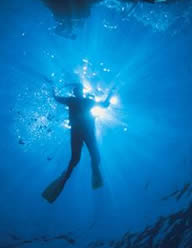 Featured Companies
|
The Basics Of Scuba Diving
Scuba Diving Classes The basics will be taught to you by a certified instructor. This instructor has logged many hours of dives before they could even take the classes on how to teach classes. Since the safety of everyone who dives hinges on the fact that they have to know how to use the tools and instruments correctly, only certified teachers are allowed to instruct classes. Classes are taught in locations where there is a pool or even shallow water that is warm if you live in a tropical region. There will be classroom time, where you learn the name of each instrument you use and how to read your dials correctly. Once you pass the test on using the tools, then you get to actually put them on and get in to the water. You cannot put on an oxygen tank and regulator until you know the basics of how to use them, read the dials and troubleshoot if there is a problem with either one. After you have taken the class you will be tested on your knowledge. You have to pass in order to be allowed to use the equipment in some situations. Other times, depending on where you go, as long as you have had class time with the tools you can get in the water with them. Scuba Diving Tools So what are all of these diving tools you need for scuba diving? Depending on where you go, you might need a wetsuit. Wetsuits will keep your skin from getting too cold, but it could also protect you from getting scratched by the equipment, rocks or other logs or items in the water with you. Other tools then include the oxygen tank, which holds all of the air you will breathe once you get underwater and are attached to it through a regulator. The regulator is what controls how much air you take in through your mouthpiece. The mouthpiece is what delivers air to your body. You will also need some type of mask, so what you see underwater is a little bit clearer. Keeping the water out of your eyes and face will help you focus on what is actually underwater instead of squinting and trying to see. Lastly, you will need an underwater watch or timer. This is set to how much oxygen you have in your tank. When the timer is close to being up, it is time to head to the surface. Comments for this post are closed |